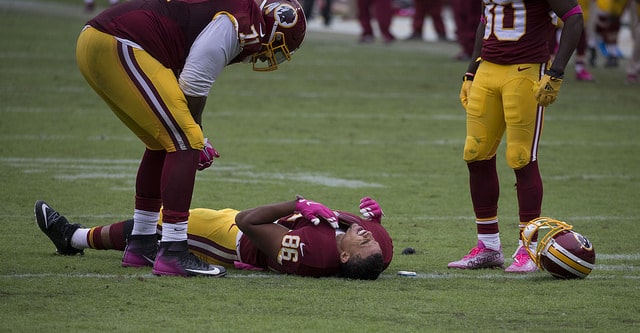“Repetitive head trauma chokes the brain! And turns man into something else.” These are the words of Dr. Bennet Omalu, played by Will Smith, in the popular movie Concussion. The movie addresses one of the most pressing questions in American sports: the question of whether playing football causes concussions.
The movie was made in reaction to news stories and studies which showed a possible link between the hard hits of football and the severe effects of brain injury. The brain disease chronic traumatic encephalopathy (CTE) is now closely associated with professional football players, both living and dead. But what are the facts?
[/et_pb_text][et_pb_text admin_label=”Text” _builder_version=”3.27.4″ text_font_size=”16″ background_size=”initial” background_position=”top_left” background_repeat=”repeat” use_border_color=”off” border_color=”#ffffff” border_style=”solid”]
Table of Contents
Football and Concussions: The Facts About CTE
In 2011, a former NFL player named Dave Duerson shot himself in the chest and left a note asking that his brain be studied. Not too long after that, former player Junior Seau took similar action. The debate over whether playing football causes concussions took off and has only grown more heated since.
A study done by Boston University and the Department of Veterans Affairs found a shockingly common link between football and CTE. Of the 91 deceased NFL players whose brains were studied, 87 had CTE. That’s over 95%! Of course, those statistics only come from one study, but they should still be very concerning.
CTE occurs in people who repeatedly suffer concussions and traumatic brain injuries. It is a degenerative disease, meaning it causes the brain to gradually deteriorate and stop functioning. Its symptoms include the following:
- Memory loss
- Irregular and impulsive behavior
- Impaired judgment
- Psychological disorders (such as depression)
- Dementia
Awareness and careful medical testing are essential, since many of these symptoms may occur naturally in any person when they get older. Identifying the problem early is one of the best ways to treat not only CTE but any disease.
What About Football Causes Concussions?
So what about football causes concussions? Blows to the head are extremely common in football and happen to nearly every player every game. Even the best helmets available are relatively ineffective at preventing concussions. They can stop fractures and other external injuries, but still, leave up to a 95% chance of concussion.
The football culture is also at fault. In the article linked above, it is noted how many young players “play through a concussion to avoid letting down their teammates, coaches, schools, and parents.” Studies have shown that high school football players suffer 11.2 concussions for every 10,000 games and practices. However, the very scientists who do these studies doubt the accuracy of their numbers, because so many players don’t report their injuries.
It isn’t only the players’ fault. Coaches often push players to “play through the pain,” risking their safety. Sideline screenings for concussions often consist of simple questions about the date or time. Much closer examination is necessary for an accurate diagnosis.
Screening for Concussions
If you or someone you know plays football and exhibits any of the symptoms discussed above, seek medical advice. The question of whether playing football causes concussions is still not entirely resolved, but there is a definite link. Always make health and safety your top priority.
Traumatic brain injuries can be devastating. We are experienced in handling brain injury cases and want to help you understand their severity. If you have any questions about CTE or concussion risks, contact us today.
Photo copyright to Keith Allison
